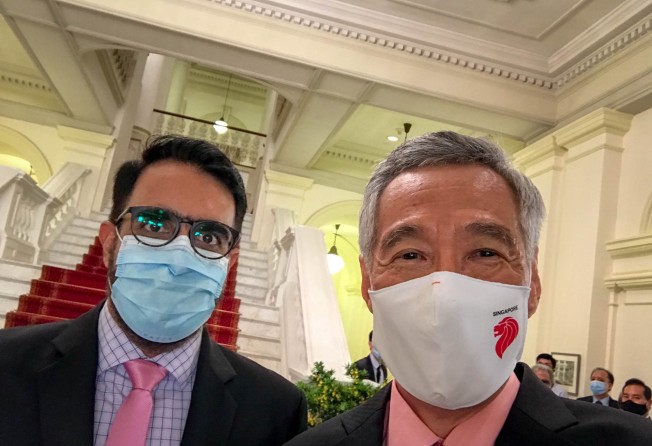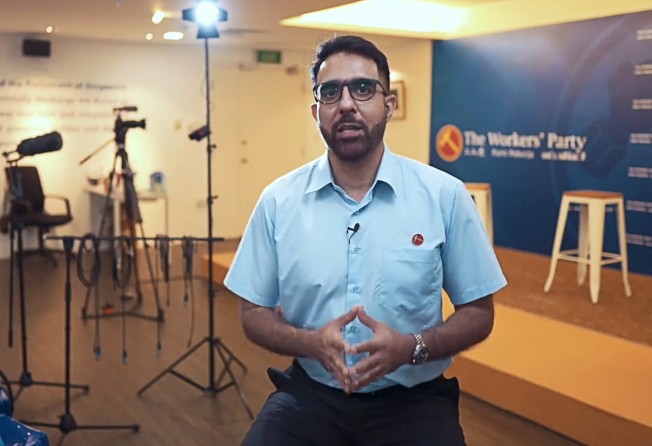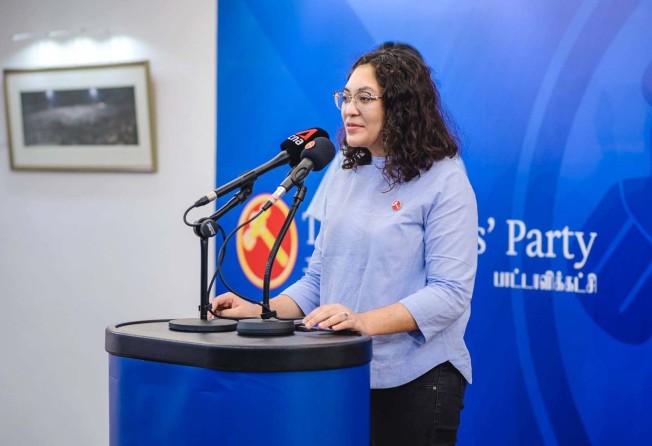
Can Singapore’s opposition Workers’ Party ride out scandal of its lying lawmaker Raeesah Khan?
- Saga surrounding Raeesah has not stopped with her resignation as an MP, but snowballed. Now it is threatening to drag down Workers’ Party leader Pritam Singh too
- As a parliamentary committee probes the WP’s handling of the matter, some warn of an ‘existential crisis’. Others caution the PAP against ‘victor’s justice’

A snowballing controversy involving a lawmaker who resigned after lying in parliament is threatening the Singaporean opposition leader, Pritam Singh, less than 18 months after his party made historic electoral gains with the backing of the city state’s younger generation.
The saga initially seemed to only involve Raeesah Khan – a darling among Gen Z and millennial voters – but an ongoing parliamentary inquiry into the case has dragged Singh and other high-ranking leaders of the Workers’ Party (WP) into the picture.
In a nine-hour testimony last Friday before the parliamentary Committee of Privileges, Singh repeatedly denied suggestions that he acted improperly by failing to take Raeesah to task even though he and two other top party leaders knew within days that her August 3 speech about the police mishandling a sexual assault case contained falsehoods.
Apart from scrutinising Raeesah’s breach of parliamentary rules, the committee – made up primarily of MPs from Prime Minister Lee Hsien Loong’s ruling People’s Action Party (PAP) – has also been probing the WP’s seemingly lackadaisical internal handling of the matter.
Edwin Tong, a legally-trained cabinet minister and member of the panel, had suggested to witnesses including Singh that the WP leadership might have initially sought to suppress Raeesah’s transgression as it would put them and the party in a negative light.
A consensus view among local political analysts interviewed by This Week in Asia was that it was almost certain that the scandal took the shine off the WP’s achievement last July in the country’s most contested elections since independence.
At the same time, some of these observers cautioned against viewing the scandal as an “existential crisis” for the party.
WP’s integrity under scrutiny
WP chief Singh’s high levels of popularity among supporters and a perception among opposition loyalists that the parliamentary probe was a partisan exercise were factors that benefited the embattled WP, said Bilveer Singh, a political-science professor at the National University of Singapore.
“The key [in the deliberations of the Committee of Privileges] is proportionality – if someone has done something wrong then that person should be punished,” said Singh, a veteran observer of local politics.
It would be “overkill” if the committee recommended punishments for Singh and other top WP leaders, he said.
In the polls in July last year, the WP party took 10 out of 93 seats – a major coup given that no opposition party has held double digit seats in the island nation since the 1960s.
The result – widely attributed to a clinical campaign run by Singh – raised hopes that the WP would continue its ascendance as a formidable check against the dominance of the PAP, which has been in power since 1959.

In the aftermath of the vote, political analysts suggested a large number of younger swing voters had backed the WP as it fielded fresh faces such as Raeesah who championed issues such as LGBT and women’s rights, free speech and climate action.
In recognition of the landmark achievement, Prime Minister Lee made Singh the country’s first ever formally-designated Leader of the Opposition.
But with the WP’s integrity now called into question, “the saga is minimally a dent on the WP’s standing,” said long-time political observer Eugene Tan.
The matter could be a body blow to the WP
“Depending on how public opinion is shaped by the Committee of Privileges’ finding and recommendations, the matter could be a body blow to the WP,” said Tan, a Singapore Management University law professor.
Nydia Ngiow, the managing director of the BowerGroupAsia strategic consultancy in Singapore, said revelations thus far had raised “serious questions” over the WP leadership’s “inability and lack of appetite towards tackling the issue”.
“The recent saga threatens to undo the [WP’s] good work in recent years, and it remains to be seen if the party is able to move past this crisis with its credibility intact,” she said.
Lying saga takes centre stage
Since Raeesah’s speech in August, when she initially lied to parliament, the issue has been in the national spotlight.
The first-time MP had said during a debate on empowering women that she accompanied a sexual assault survivor to a police station only to have an officer make insensitive comments towards the complainant.
Subsequently pressed for details by senior officials, including the law and home affairs minister K. Shanmugam, Raeesah said she was not able to divulge further information due to confidentiality.
But in a bombshell turn of events on November 1, she admitted that the anecdote had been fabricated. She did not in fact follow the victim to the police station, but had heard the account in a sexual assault survivors support group that she was part of.

The lawmaker said she herself had been sexually assaulted at the age of 18 while studying overseas, which is why she had attended the group session.
Raeesah suggested that this experience influenced the way she narrated the episode, saying in a tearful speech that she did not have the courage to report her own assault.
On November 30, she resigned from the WP before its top decision-making body was to decide on whether to sack her.
The saga has dominated local headlines since December 1, when the Committee of Privileges proceedings began. The panel is continuing to interview witnesses, but has thus far issued four interim reports following the testimonies it has heard so far.
It also released footage of the depositions.
In her testimony to the committee, Raeesah said the trio she initially confessed to – Singh, party chairwoman Sylvia Lim and vice-chairman Faisal Manap – told her that “the best thing for her to do would be to continue with the narrative that she had already given in parliament”.
The committee also heard evidence from two of Raeesah’s aides to whom she had sent a text message saying the party leaders instructed her to take the lie “to the grave”.
Singh, Lim and Faisal have denied this took place. Lim and Faisal said while they had been made aware of the lie five days after Raeesah’s August 3 speech, they largely left the matter in Singh’s hands.
The three politicians faced intense grilling from Tong – a former high-flying lawyer – over the contradictions between their own accounts of what happened and Raeesah’s testimony.
Parts of Singh’s evidence, including his claim that he did not feel it was important to disclose his own knowledge of Raeesah’s lie as soon as he became aware of it, was ridiculed online.
Mixed reactions
But reactions appeared split along partisan lines. WP backers suggested Tong was seeking to pin blame on Singh based on a preconceived conclusion on who was culpable instead of conducting a fact-finding exercise in earnest.
With footage of the testimonies made public on YouTube, some social media accounts uploaded snippets of Singh’s testimony that put him in a positive light.
“You are trying to catch me in a ‘gotcha moment’ in one question you put in there. I am sorry, Mr Tong. You are a good lawyer, but I am a good listener,” Singh quipped in one of the clips posted by the Twitter account @PritamFanbot that have gone viral in recent days.
Given the convoluted nature of the controversy, such reactions from the public was to be expected, observers said. “Entrenched supporters of the PAP and the WP would probably each have made up their minds about who is at fault,” said Loke Hoe-Yeong, author of a book on the history of Singapore’s opposition.
“Mr Tong, you can’t bind me with a piece of sewing thread because that’s what it is.” pic.twitter.com/tUmYUdIpOj
— Pritam Singh Fan Bot (@PritamFanBot) December 12, 2021
Tan, the law professor, said the possibility that the WP leadership trio comprising Singh, Lim and Faisal would be sanctioned by parliament – following the Committee of Privileges’ final findings – “cannot be discounted”.
But even if the committee finds them “complicit in misleading parliament”, the PAP-dominated legislature would have to be cautious not to be seen as meting out ‘victor’s justice’,” he said.
“If parliament were to mete out what is widely perceived as crushing sanctions, then it could backfire on the ruling party.”
The WP, founded in 1957, is the biggest among the country’s small opposition parties and has weathered major controversies in the past.
In the 1980s and 1990s, its then leader J.B. Jeyaretnam was repeatedly successfully sued for making comments about PAP leaders deemed libellous, though he was feted by supporters as an unflinching critic of the strong-fisted ruling party.
More recently, the WP in 2012 expelled an incumbent MP, Yaw Shin Leong, after he failed to address allegations of an extramarital affair.
Apart from the saga involving Raeesah, the party currently faces a separate predicament involving a civil suit over the mismanagement of S$33.7 million (US$24.6 million) of municipal funds.
Singh, Lim and the retired party chief Low Thia Khiang are liable for damages, according to a 2019 High Court verdict.
All three face potential bankruptcy, which could lead Singh and Lim to lose their parliamentary seats.
The case is being deliberated upon by the country’s apex judicial body, the Court of Appeal.